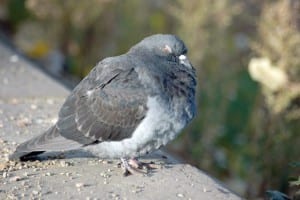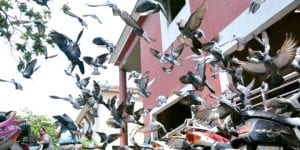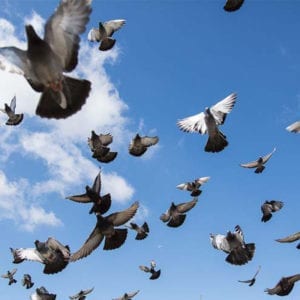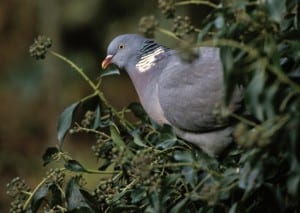
by Pigeon Patrol | May 24, 2016 | Bird Deterrent Products, Bird Netting
 Schlueterville has an unwelcome visitor that roosts in our covered back porch. Its calling card is a horrifying pool of guano splattered under the iron chandelier — a gift we discover each morning as we pass by the window on the way to the coffee pot.
Schlueterville has an unwelcome visitor that roosts in our covered back porch. Its calling card is a horrifying pool of guano splattered under the iron chandelier — a gift we discover each morning as we pass by the window on the way to the coffee pot.
“Haha!” the guano taunts. “Here I am again! You’ll never catch Mystery Marauder!”
Whatever is leaving the mess must be sizable, stealthy, nocturnal and at least partially feathered.
“It’s either goose, pigeon or a freaking gargoyle,” Hunka grumps said before dragging out the hose. “From the size of that mess, it could be a moose with digestive problems.”
Maybe it’s a moose wearing a feather boa. (This is the kind of junk we think about since ditching cable.)
Attempts to catch the culprit have proven futile. All is clear when we head to bed, and the Schlueterville setters promise to keep an eye out for anything amiss. (News flash: Schlueterville setters fib.) The next morning, voila! The patio is festooned with scattered feathers and colossal heaps of goo.
Word, chirp, hoot or honk seems to be spreading throughout the animal kingdom about our cozy, sheltered refuge.
Last summer, we returned from vacation to find a big-eared, pug-nosed bat nestled in the crook of our patio roof. We named him Hector. He pooped a lot, too.
Hector was allowed to hang around as long as he ate mosquitoes and stayed out of my hair.
He wasn’t the Brad Pitt of bats, but we grew rather fond of the little bugger. He did his thing. We did ours. Mosquitoes were terrified. All was well with the world.
We even installed a bona fide bat house, but he wasn’t interested in making a move. Then one day he flew off to find warmer climates and a meatier buffet. So long, Hector.
Squirrels are a different sort of cat. Hunka hates them with a passion, engineering elaborate gizmos to keep them from wrecking backyard bird feeders and gorging on seeds.
Hunka moves the pole this way. Squirrels jump from the fence. He moves it that way, they sail from the roof. He installs baffles on the feeders. They shinny up anyway, like acrobatic circus performers. He sics the setters on them, only to watch the prey charge up a maple and sarcastically shake their tails.
Squirrels back stroke in the dog dish. Squirrels eat fist-sized holes in window screens and the garage door.
Squirrels drive Hunka batty.
In a fit of rage, Hunka yanked up every pole and stored every feeder. Take that, you little (insert salty language here).
The birds are out of luck, which brings me back to our current intruder.
Perhaps Mystery Marauder is protesting the removal of bird feeders from the Schlueterville backyard.
This is the year of the protest, it seems, and piles of dung make a definite statement.
Maybe Hector the bat landed in a Texas barn loft somewhere, and told resident pigeons they should check out a particular bed and breakfast in Hastings, Nebraska.
“It’s comfortable and free of charge,” he’d say. “Plus, the humans and dogs are too busy chasing squirrels to pose a threat.”
Perhaps a featherbrained goose took a wrong turn while migrating, and needed a place to rest.
Heck, maybe there really is a gastro-challenged moose on the loose, taking a tour of the best places to squat in Hastings.
Then there’s the gargoyle theory, which is creepy and costing me sleep.
We are fully aware that this dirty dilemma is a first world problem. There are far more pressing issues at hand.
But we’ll be happy when Mystery Marauder packs up his crap and moves on down the line.
About Pigeon Patrol:
Pigeon Patrol Products & Services is the leading manufacturer and distributor of bird deterrent (control) products in Canada. Pigeon Patrol products have solved pest bird problems in industrial, commercial, and residential settings since 2000, by using safe and humane bird deterrents with only bird and animal friendly solutions. At Pigeon Patrol, we manufacture and offer a variety of bird deterrents, ranging from Ultra-flex Bird Spikes with UV protection, Bird Netting, 4-S Gel and the best Ultrasonic and audible sound devices on the market today.
Voted Best Canadian wholesaler for Bird Deterrent products four years in a row.
Contact Info: 1- 877– 4– NO-BIRD (www.pigeonpatrol.ca)

by Pigeon Patrol | May 23, 2016 | Bird Netting, Pigeon Spikes
 PIGEONS that congregate outside Masjid Haji Muhammad Salleh mosque have been getting an extra ingredient in their breakfast.
PIGEONS that congregate outside Masjid Haji Muhammad Salleh mosque have been getting an extra ingredient in their breakfast.
Every day, pigeons that flock to the area are served a corn-based feed containing a drug called nicarbazin, which stops the female birds from developing eggs or causes them to lay eggs that do not hatch.
This is a new “birth control” method to limit pigeon numbers tested by the Agri-Food and Veterinary Authority of Singapore (AVA), at a field outside the mosque at Palmer Road near Shenton Way.
The trial, which started on Oct 13 and will last a year, comes on the back of soaring complaints about the nuisance caused by pigeons.
AVA has already received about 3,400 pieces of pigeon-related feedback from Jan to Oct this year, more than the 2,500 they received in the whole of last year and the 2,100 in 2013.
It has also seen a growth in feedback about all kinds of birds, including pigeons, from some 4,400 messages in 2013 to 6,100 in the first 10 months of this year alone.
Mohamed Idris, secretary of the management board of the mosque at Palmer Road, said pigeons have always been around, but the problem worsened over the last 10 years.
The field outside the mosque has an estimated 400 pigeons, twice as many as two years ago. The birds would fly into the mosque compounds, making them a nuisance to staff and people who go to the mosque to pray.
“They leave their droppings on the floor and you walk on it… They congregate at the food areas as well,” he said.
This has led AVA to choose the mosque as the first area to try out the new method.
During a demonstration yesterday, Janet Chia, executive manager of the Operations (Wild Animals) section at AVA, said it will take about a year to see a drop in the pigeon population there.
Around five mosque volunteers will be in charge of feeding the laced feed to the pigeons. The method could be rolled out to other areas in Singapore if the trial succeeds.
When tested in Italy, the method was found to reduce the pigeon population there by 30 to 40 per cent over four years.
The drug does not harm the birds and is not toxic to animals or humans if taken in small amounts. It would take 40kg of the feed to see toxic effects in dogs and cats, and 60kg for a child, said Ms Chia.
She also urged the public not to feed birds, as this “would encourage their population size to grow and encourage them to congregate and cause nuisance”.
Feeding pigeons is illegal and those found to flout the rules face a fine of up to $500. AVA has caught 113 bird feeders so far this year, including 13 who did so outside the mosque.
About Pigeon Patrol:
Pigeon Patrol Products & Services is the leading manufacturer and distributor of bird deterrent (control) products in Canada. Pigeon Patrol products have solved pest bird problems in industrial, commercial, and residential settings since 2000, by using safe and humane bird deterrents with only bird and animal friendly solutions. At Pigeon Patrol, we manufacture and offer a variety of bird deterrents, ranging from Ultra-flex Bird Spikes with UV protection, Bird Netting, 4-S Gel and the best Ultrasonic and audible sound devices on the market today.
Voted Best Canadian wholesaler for Bird Deterrent products four years in a row.
Contact Info: 1- 877– 4– NO-BIRD (www.pigeonpatrol.ca)

by Pigeon Patrol | May 22, 2016 | Animal Deterrent Products, Bird Netting, Pigeon Patrol's Services
 Residents of a road plagued by pigeons are calling for people who feed them to be fined.
Residents of a road plagued by pigeons are calling for people who feed them to be fined.
Court Road in Sparkhill regularly features hordes of pigeons making a mess on the houses and park, according to those who live there.
Signs tell people not to feed the pigeons – but the advice is ignored on a daily basis, say residents.
Aisha Khan, of Court Road, said the pigeons were “making a mess all around” and were “totally annoying”.
Neighbours are calling on Birmingham City Council to introduce a by-law so people who feed the birds can be fined.
The council said there were no plans to introduce by-laws but it was working with the community to promote cleaner streets.
About Pigeon Patrol:
Pigeon Patrol Products & Services is the leading manufacturer and distributor of bird deterrent (control) products in Canada. Pigeon Patrol products have solved pest bird problems in industrial, commercial, and residential settings since 2000, by using safe and humane bird deterrents with only bird and animal friendly solutions. At Pigeon Patrol, we manufacture and offer a variety of bird deterrents, ranging from Ultra-flex Bird Spikes with UV protection, Bird Netting, 4-S Gel and the best Ultrasonic and audible sound devices on the market today.
Voted Best Canadian wholesaler for Bird Deterrent products four years in a row.
Contact Info: 1- 877– 4– NO-BIRD (www.pigeonpatrol.ca)

by Pigeon Patrol | May 21, 2016 | Bird Netting, Pigeon Patrol's Services, Pigeon Spikes
 An innovative attempt to deter pigeons from a popular beach using thousands of scented yellow stickers was deemed a success after it avoided being blacklisted under new EU water bathing regulations.
An innovative attempt to deter pigeons from a popular beach using thousands of scented yellow stickers was deemed a success after it avoided being blacklisted under new EU water bathing regulations.
Teignmouth beach in Devon was among 13 beaches which had been expected to fail tough new tests for cleanliness but which managed to make dramatic improvements in order to make the grade.
Twelve beaches failed to meet the new standards, meaning that they must put up signs before the swimming season begins next May advising tourists to stay out of the water.
The move could have serious ramifications for local business and tourism in those much-loved spots, which include Clacton in Essex, East Looe in Cornwall, Walpole Bay in Margate, Kent and Wildersmouth in Ilfracombe, North Devon.
The new EU bathing water regulations raise the “pass mark” for beaches around Europe.
They judge water quality on a four-year average, meaning that 25 beaches identified as ‘at risk’ earlier this year due to poor results in previous years were given the chance to make last-ditch improvements to turn things around.
Among them was Teignmouth, where guano from hundreds of pigeons roosting beneath its pier had become one of the major sources of pollution.
Previous attempts to scare away the pigeons had failed so the council this year resorted to deploying thousands of yellow stickers scented with citronella and garlic at pigeon-width intervals under the pier to try to deter them from roosting.
The project, undertaken with a £15,000 grant from the Environment Agency, significantly reduced the number of pigeon and seagull guano getting into the water.
Blackpool North and Blackpool Central had also faced blacklist, in part due to droppings from donkeys doing tourist rides.
Donkey owners were urged to clean up after the animals to avoid the faeces being left on the sand and washed out to sea.
But the local council said that the main issues, involving sewage, had been eradicated because United Utilities had invested £160million worth of infrastructure improvements.
Agriculture was cited as the main pollutant at several beaches often due to effluent from livestock grazing near streams that feed into the sea, and new cattle fencing was installed to tackle the problem.
Many other beaches had problems from sewage treatment works or sewage overflows.
Although far more beaches managed to avoid blacklist than had been expected, the new regulations mean that only 97 per cent of England’s bathing waters are deemed clean enough to swim in, as opposed to 99.5 per cent last year, when just two spots failed to reach the mandatory grade: Lyme Regis Church Cliff Beach, Dorset, and Staithes, North Yorkshire. Both remain on the blacklist.
In total, 63.6 per cent of bathing waters meet the new “excellent” standard.
Rory Stewart, the Environment Minister, said: “We continue working to further improve the quality of our water, and last year our coast was the cleanest it has ever been.
“Swimming is allowed and all beaches remain open; new EU standards are simply there to advise and inform the public on water quality.
“I want Britain’s beaches, seas and lakes to have the cleanest water in the world. We need everyone to help us achieve this – from Government, water companies and councils to local communities.”
Dr Pete Fox, director of land & water at the Environment Agency added: “Water quality at beaches is better than any time in living memory, with dramatic improvements having been made over the last few decades.
“The Environment Agency has led successful work to monitor, investigate and reduce pollution, which has benefited the environment and people with nearly all of England’s beaches meeting the new stringent water quality standards.”
About Pigeon Patrol:
Pigeon Patrol Products & Services is the leading manufacturer and distributor of bird deterrent (control) products in Canada. Pigeon Patrol products have solved pest bird problems in industrial, commercial, and residential settings since 2000, by using safe and humane bird deterrents with only bird and animal friendly solutions. At Pigeon Patrol, we manufacture and offer a variety of bird deterrents, ranging from Ultra-flex Bird Spikes with UV protection, Bird Netting, 4-S Gel and the best Ultrasonic and audible sound devices on the market today.
Voted Best Canadian wholesaler for Bird Deterrent products four years in a row.
Contact Info: 1- 877– 4– NO-BIRD (www.pigeonpatrol.ca)

by Pigeon Patrol | May 20, 2016 | 4-S Gel Bird repellent, Bird Netting, Pigeon Patrol's Services

Ajay Sood is one amongst many professional Kabootarbaaz, whose family has lived in the gullies of the Dhobi Bada, Kinari Bazar in Old Delhi. Everyday, he spends hours training his flock of pigeons in kabootarbaazi. Express Photo by Tashi Tobgyal New Delhi 291215
A quiet British street has been turned into a real-life version of Alfred Hitchcock’s horror film The Birds after being plagued by thousands of pigeons.
Residents in Court Road in Sparkhill, Birmingham, are calling on the council to start fining people who feed the birds.
Thousands of pigeons flock to the street, which overlooks a local park, every day – covering the pavement, cars and residents, with droppings.
The pigeons are flocking in their thousands to Court Road, Sparkhill, despite Birmingham City Council warning residents not to feed them
Pictures show the birds completely covering the roofs of rows of terraced houses as they wait for people to come and feed them.
Birmingham City Council have placed signs in the area urging residents to ‘Stop feeding pigeons!’.
Residents said the street is plagued by the birds, which even fly down chimneys to get inside people’s houses.
The road overlooks a nearby park, where the pigeons can be seen amassing in a feeding frenzy and ignoring the council’s signs on display
Some residents have complained that the pigeons have managed to get into their houses through their chimneys
Samuel Okello, 25, said: ‘Sometimes in the night, some of them go in the chimney.
‘When you sleep you feel as if they are flying inside.
‘The smell as well, it’s terrible and it must put people off coming to the area.
One residents said the park has become a ‘no-go area’ and that parents no longer take their children to play
‘They have basically made the park a no-go area and nobody would play there with their children.’
Resident Saif Khan said: ‘There are too many rats and mice coming because of this.
‘They are getting in the houses.
‘It looks like something from the Alfred Hitchcock horror film and can be quite intimidating when you see thousands of them up there.’
Despite the thousands of pigeons (pictured above) in the street, the council insists it is not planning to introduce a by-law to fine those caught feeding the birds
Council chiefs have put signs in the park which read: ‘Stop feeding pigeons! Due to the ever increasing number of rats and the consistent fouling of the footpath visitors are kindly asked to stop feeding the pigeons in this park.’
Neighbours are now calling on Birmingham City Council to introduce a by-law so people who feed the birds can be fined.
But the authority said there were currently no plans to introduce by-laws and added it was working with the community to promote cleaner streets.
About Pigeon Patrol:
Pigeon Patrol Products & Services is the leading manufacturer and distributor of bird deterrent (control) products in Canada. Pigeon Patrol products have solved pest bird problems in industrial, commercial, and residential settings since 2000, by using safe and humane bird deterrents with only bird and animal friendly solutions. At Pigeon Patrol, we manufacture and offer a variety of bird deterrents, ranging from Ultra-flex Bird Spikes with UV protection, Bird Netting, 4-S Gel and the best Ultrasonic and audible sound devices on the market today.
Voted Best Canadian wholesaler for Bird Deterrent products four years in a row.
Contact Info: 1- 877– 4– NO-BIRD (www.pigeonpatrol.ca)

 Schlueterville has an unwelcome visitor that roosts in our covered back porch. Its calling card is a horrifying pool of guano splattered under the iron chandelier — a gift we discover each morning as we pass by the window on the way to the coffee pot.
Schlueterville has an unwelcome visitor that roosts in our covered back porch. Its calling card is a horrifying pool of guano splattered under the iron chandelier — a gift we discover each morning as we pass by the window on the way to the coffee pot.

 PIGEONS that congregate outside Masjid Haji Muhammad Salleh mosque have been getting an extra ingredient in their breakfast.
PIGEONS that congregate outside Masjid Haji Muhammad Salleh mosque have been getting an extra ingredient in their breakfast.
 Residents of a road plagued by pigeons are calling for people who feed them to be fined.
Residents of a road plagued by pigeons are calling for people who feed them to be fined.
 An innovative attempt to deter pigeons from a popular beach using thousands of scented yellow stickers was deemed a success after it avoided being blacklisted under new EU water bathing regulations.
An innovative attempt to deter pigeons from a popular beach using thousands of scented yellow stickers was deemed a success after it avoided being blacklisted under new EU water bathing regulations.
